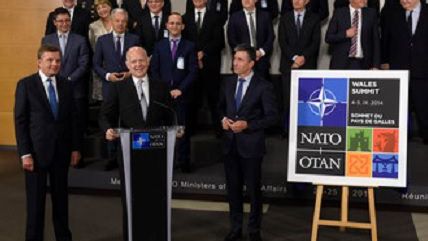Let's Have Some Honesty and Realism at the NATO Conference
Don't hold your breath

Don't hold your breath, but it would be refreshing if NATO leaders meeting in Wales this week spoke candidly for once about Ukraine.
They could start by embracing this observation by John Mearsheimer, the distinguished foreign-policy scholar at the University of Chicago:
According to the prevailing wisdom in the West, the Ukraine crisis can be blamed almost entirely on Russian aggression. Russian President Vladimir Putin, the argument goes, annexed Crimea out of a long-standing desire to resuscitate the Soviet empire, and he may eventually go after the rest of Ukraine, as well as other countries in eastern Europe.…
But this account is wrong: the United States and its European allies share most of the responsibility for the crisis. The taproot of the trouble is NATO enlargement, the central element of a larger strategy to move Ukraine out of Russia's orbit and integrate it into the West.
This will startle most people who rely on major media outlets for their news and analysis. But Mearsheimer is no fringe character or fan of Russian President Vladimir Putin. He's a member of the "realist" school of foreign policy, which assumes that governments tend to act rationally in their political self-interest.
As Mearsheimer points out, Russia was provoked, (as many had warned, for nearly 20 years, that it would be). After the demise of the Soviet empire and Warsaw Pact, the Russian leadership did not object to NATO's continued existence, he writes. In fact, the Russians counted on NATO to restrain Germany. But they "did not want NATO to grow any larger and assumed that Western diplomats understood their concerns. The Clinton administration evidently thought otherwise, and in the mid-1990s, it began pushing for NATO to expand."
Thanks to Bill Clinton and George W. Bush, NATO moved east to Russia's border, incorporating the Warsaw Pact and Baltic states. Especially provocative has been the open talk of admitting border states Georgia and Ukraine, both former Soviet republics. Ukraine was the invasion route into Russia three times in the past and has long hosted a major Russian naval base in Crimea.
When Ukraine and Georgia came close to joining NATO in 2008 (postponed when France and Germany feared it would provoke Russia), Putin warned that their membership would be a "direct threat." His brief war against Georgia that year, after Georgian forces attacked a separatist region on Russia's border, presaged what was to come.
Meanwhile, American neoconservatives spoke of Ukraine as "the biggest prize," in the words of Carl Gershman, head of the National Endowment for Democracy (NED), which receives a lot of U.S. taxpayer money to meddle in other countries' elections. After the Soviet empire fell, Ukraine had governments friendly to the West, but in 2010, Viktor Yanukovych, who did not view Russia as an adversary, was elected president. Mearsheimer writes that "the NED decided he was undermining its goals, and so it stepped up its efforts to support the opposition."
When Yanukovych balked at an economic offer from the European Union in favor of a deal with Russia, antigovernment demonstrations, encouraged by U.S. officials who wanted regime change, took place in Kiev, and pressure ratcheted up until Yanukovych fled the country.
"For Putin, the illegal overthrow of Ukraine's democratically elected and pro-Russian president — which he rightly labeled a 'coup' — was the final straw," writes Mearsheimer. "He responded by taking Crimea, a peninsula he feared would host a NATO naval base, and working to destabilize Ukraine until it abandoned its efforts to join the West."
Mearsheimer notes that the "new government in Kiev was pro-Western and anti-Russian to the core, and it contained four high-ranking members who could legitimately be labeled neofascists."
Under these circumstances, Putin has acted as any Russian ruler would be expected to act with his country encroached on from the west: "His response to events there has been defensive, not offensive."
"This is Geopolitics 101," Mearsheimer continues. "Great powers are always sensitive to potential threats near their home territory. After all, the United States does not tolerate distant great powers deploying military forces anywhere in the Western Hemisphere, much less on its borders."
Yet another manufactured crisis — costing over 2,000 lives. It could be brought to a speedy end if Barack Obama would give the word.
This article originally appeared at the Future of Freedom Foundation.

Show Comments (103)